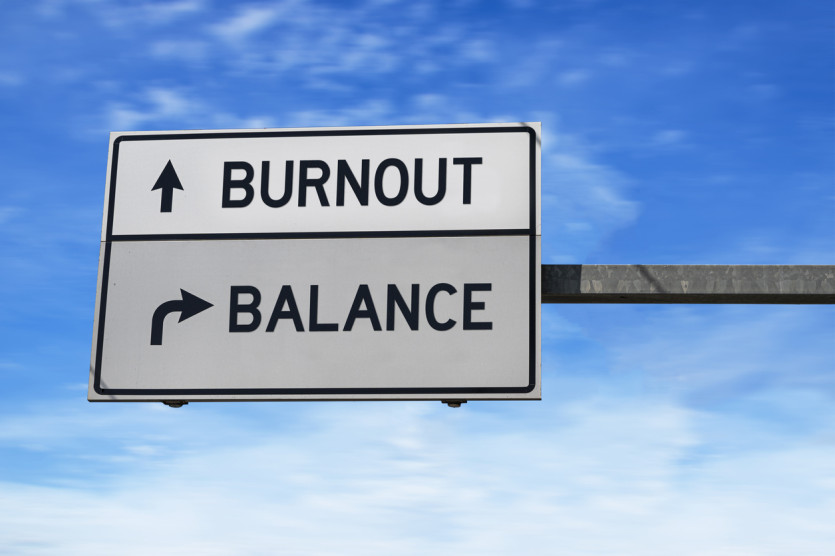5 tips to avoid burnout at work
August 11, 2022
Are you feeling overworked? If you answered yes, you may be experiencing burnout, and these 5 tips to avoid burnout may help.
Sponsored by K2 Enterprises
 What is burnout?
What is burnout?
Burnout occurs from chronic workplace stress. The World Health Organization (WHO) classifies burnout as an occupational phenomenon rather than a medical condition.
Burnout comes from constant exposure to stressful situations, like job demands and lack of resources. As a result, people who experience burnout lose interest in their jobs and feel demotivated at work.
What does workplace burnout look like?
Workplace burnout can be difficult to recognize because it looks like many other medical issues. Symptoms include:
- Fatigue
- Low concentration
- Insomnia
- Irritability
- Lack of interest in hobbies and social activities
- Less drive to perform daily responsibilities
- Feeling of emptiness
Causes of burnout
According to WHO, time pressure, long work hours, and lack of support are among the primary causes of burnout. For example, burnout happens when we are not given enough freedom to work on our terms. In addition, we want to receive enough professional and moral support to succeed.
In the same vein, many in the accounting profession must always be in control. If we are not, we start feeling frustrated and stressed. This happens at work, where the demands of the job are beyond our own hands. For example, lack of client responsiveness, changing priorities, and urgent deliverables with deadlines trigger frustration. Job stress follows if these same concerns happen repeatedly.
Likewise, lack of support also results in burnout. On the other hand, if there are no clear and consistent goals and scope delineation, frustration, stress, and burnout can set in. For instance, software engineers are sometimes expected to be project managers while executing coding tasks. They are susceptible to burnout if they are not well-supported while learning project management and doing deployments on the side.
Consequences of burnout
Most importantly, a person experiencing workplace burnout might not perform well. They can become irritable and impatient. However, if not managed, burnout can translate to their quality of work. As a result, burnout can impact relationships with clients and customers, affecting the bottom line. Subsequently, burnout can also lead to clinical mental conditions, such as anxiety, panic attacks, or depression.
5 great tips to prevent workplace burnout
Our tips below will help you reduce unnecessary work stress and avoid burnout. Certainly, other ideas, including hobbies, meditation, music, diet, and exercise, may work for you.
1. Take vacations
Take vacations when you need them. You should not feel obliged to work extra hours because of an excessive workload. On the other hand, your boss should not also expect you to be available 24/7. If they do, you will probably end up burning out. So, if your manager does not give you adequate vacation leave, ask for it.
2. Join support groups and networks
According to Frontiers in Psychology research, support groups help ease burnout. Support groups are an excellent avenue for employees to discuss problems and share ideas. These groups offer adequate support and tend to be formed for employees with the same expertise. These could come in the form of communities of practice.
3. Set some boundaries
Say no to unreasonable requests. Do not let yourself be pulled into other people’s responsibilities. Talk to your partners, managers, or supervisors about getting additional help when your workload becomes unmanageable. Do not hesitate to ask your manager for time off.
4. Learn to incorporate technology
Using technology effectively can free you from tedious, repetitive tasks. Tech tools such as project management software, time tracking systems, and document scanners can help organize and streamline your workflow. To learn tech hacks, you may enroll in online boot camps and schools like App Academy, Flatiron School, and Thinkful.
5. Request for a flexible work arrangement
A flexible work environment is essential to maintain employee productivity and motivation. To avoid burnout, you must look for a work arrangement that prevents burnout. This may come in the form of remote work or flexible work schedules.
Summary
Burnout can affect anyone in any industry. For example, working too much and not allotting time for yourself can lead to burnout. As a result, you can become forgetful, irritable, and unmotivated. These signs indicate that you should take a step back, breathe and recharge, and strategize your approach to work. In addition, we recognize that part of the great resignation and retirement might be a burnout response. In conclusion, try our 5 tips to avoid burnout above to ensure you will be on your way to a healthier work lifestyle.
